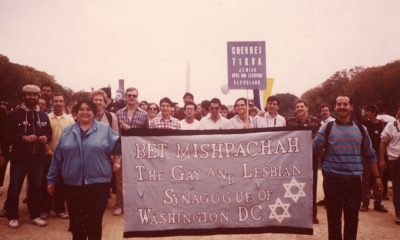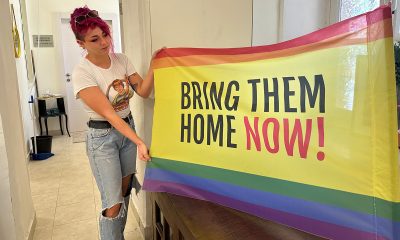Arts & Entertainment
What the Blade means to me
Former employees reflect on impact of the newspaper
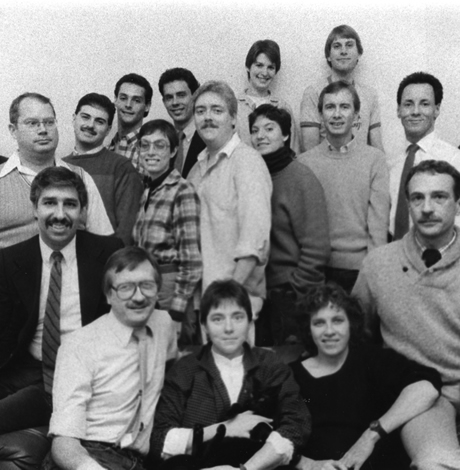
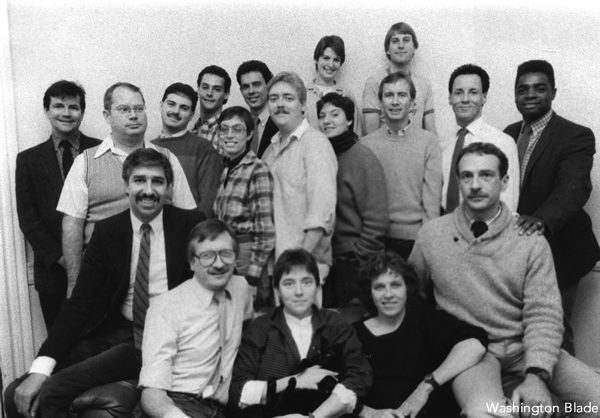
As we wrap our yearlong celebration of the Washington Blade’s 50th anniversary, we wanted to provide space to former employees to reflect on what the newspaper means to them. Here is a sampling of what they had to say. Thanks to everyone for contributing.
JERYL PARADE, Blade account executive, 2009-2016
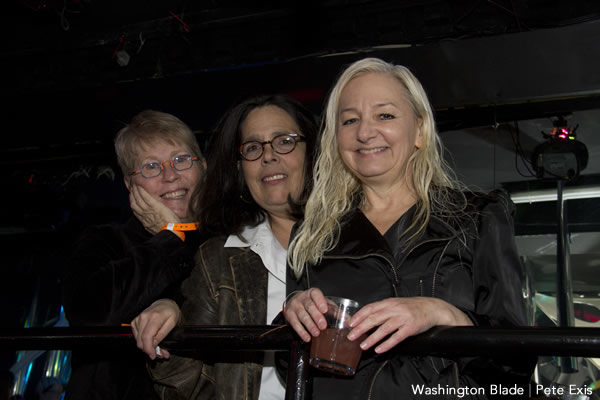
“I need to tell you this is the last issue of the newspaper you will be delivering. It’s not you. It’s us. We’re shutting down.”
“What will you do?”
“Look for a job. But not here. In D.C.
“You should apply at the Blade.”
“The Blade?”
“We’ve been there trying to get their distribution business. You should see the offices. They’re beautiful”.
“Yeah. OK. Thanks for the advice.” But I’m not gay.
On July 26, 2009, I emailed publisher Lynne Brown my three-page resume with 18 bullet points of publishing accomplishments. She responded on July 31, 2009. “Thanks for writing. There are only opportunities in life.”
In a subsequent email we agreed to meet on Wednesday at 11 a.m. Lynne wrote, “We are generally a casual group. So dress to be yourself.”
I did not know if she meant this or was being crafty. Should I really show up in a ‘90s Goth thing? I decided on a business suit. The Blade is, after all, a business.
And then some!
Happily I got the job. It was advertising sales. I had been a manager for 25 years, but when you work with clients, as I had, you are in sales.
I am able to tell on the first day of a new job if it is going to work out. On that first day — even though all I did was read the employee manual — I felt good. I was breathing in fresh air.
The next day I made my first sales call. It resulted in a sale. You know it can take 10 or more calls or emails to connect with someone and five or more contacts with said someone to seal the deal. If you’re lucky. Not so with the Blade. I was batting 1,000 percent!
Still, I was feeling stilted compared to my debonair coworkers. I remember seeing a team photo from the previous holiday season. Everyone dressed in black. I don’t think anyone was smiling. I would never be as cool as that.
About two and a half months into my tenure, on Monday, Nov. 16, 2009, we came in to work and were told (by the then parent company) to go home. Plenty has been written about the days and weeks that followed. I won’t go into that here. I consulted with my father about what to do next. I told him how the employees had a plan to keep publishing. My dad advised me to stay. He said, “It might be better.”
From then on I learned how to work on a commission-only basis and have confidence in my own and our success. I had always worked at a desk, in an office. Now I was free. An advertiser would call me on my cell while I was on the streets of downtown D.C. How cool was I now? I was Blade cool.
One of my most vivid memories of working for the Blade is from 2013 in the Venetian Jewish Ghetto. My friend was on a tour while I was in the piazza taking a call from the Washington Women’s Rugby Football Club (DC Furies) about advertising in our LGBTQ Sports Issue. I had sent an email blast earlier that week from our hotel room in Rome to let everyone know I had previewed the content and it was amazing!
Being “not gay” was never an issue. My advertisers and co-workers did not care which of the letters comprising the acronym I was. I had always assumed it was A for Ally. Now I know. It’s G. For Grateful.
KEN SAIN, Blade news editor, 2003-2005
Perhaps the most important thing we have learned since Stonewall is that visibility is everything. Many of the advances the LGBTQ community has made in these past decades are because ordinary people had the courage to come out.
Each generation has made it easier for the next, and the current one will make it even easier for those who follow. It was far easier in those early years for an Anita Bryant and others to go argue for discrimination when it was just some drag queens no one knew in San Francisco who were denied rights and being assaulted.
It’s a lot harder to make that case when it’s your uncle, or sister, or child.
So yes, give credit to the leaders for inspiring us and willing to be the face that took the criticism. But remember that each of us who had the courage to tell our truth to family and friends and co-workers also did our part to help change public opinion.
And give some credit to the Washington Blade. For 50 years it has been covering the struggle, helping to inspire new generations by telling the stories of those who came before. It was a source of news for our community when others didn’t even acknowledge our issues. The Blade did so while maintaining the highest standards of journalism and ethics.
I know from my time as news editor what a vital role the Blade has in the community. I like to think that by covering the community fairly and with integrity we achieved our goals of informing and in some cases entertaining readers. I also believe that by putting a spotlight on the stories of our community, we helped moved the needle on public opinion in some small way.
I am deeply proud of my time working for the Blade and the work we did. There is something special about working with quality people on a righteous cause. Our cause was to show that we could do great journalism for LGBTQ readers and keep them informed of the issues that that in many cases no one else was covering.
In doing so, we helped make our community more visible. And as we’ve learned during these past 50 years, being more visible is one key to being accepted.
Happy 50th anniversary, Blade.
KRISTINA CAMPBELL, Blade reporter, managing editor and editor, 1992-2002
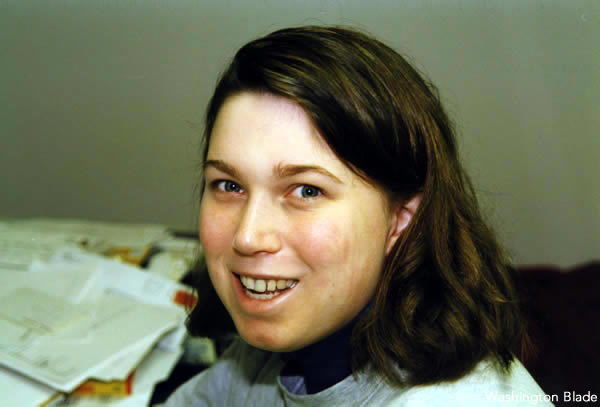
The thing I remember most about the Blade was the company’s elegant balance as a fun and often lighthearted atmosphere that was also a professional workplace where we were serious about our mission and our product. I felt close to everyone in the newsroom, especially as I rose the editor ranks and started supervising people who had been my colleagues. It was an honor to be trusted with that role. I remember the work being challenging but rewarding, every day of my tenure there, until the ownership changed and some workplace issues started clouding my focus on the news. I felt an obligation to the community the entire time I worked at the Blade, because it was so important to get the information correct, to be fair, to create a record for information and developments that the mainstream media was only beginning to cover. And I also felt a responsibility to act with objectivity and to give fair and respectful treatment to adversaries of the community or its civil rights work. That was sometimes difficult, but it made me a better journalist and, I think, a better person.
I grew up in that job, and I had fun doing it. It was an exciting time to cover gay civil rights issues — news was always developing and it felt like we as a community were on the brink of big things. Indeed, the big things gradually took shape. I often think about the current presidential administration and how working at the Blade would be so different now, and likely frustrating, as significant pieces of the progress we covered is at risk of (or in the process of) being rolled back.
The Blade was, I insisted then and maintain now, the most reliable and professional source of hard news about the gay movement anywhere in the world when I worked there, for most of the 90s and into the next decade, And that was quite something to be part of. I always had such deep respect for the people who hired me and shaped me into a professional — Don Michaels and Lisa Keen — because they gave their careers to being the daily historians of a civil rights movement. The same is true for the longest-tenured Blade staffer in history, Lou Chibbaro Jr., whose professionalism and hard-nosed reporting style made each issue of the paper better. I was fond of everyone on the staff, but those three really made that newspaper into an institution I was proud to participate in.
RHONDA SMITH, Blade reporter, features editor, 1997-2005; intern, 1984
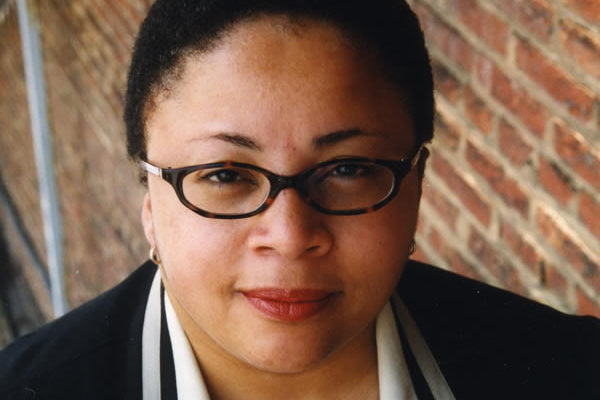
I was a journalism undergraduate at Howard University during the early 1980s when I became an intern at the Washington Blade under the tutelage of Lisa Keen and Don Michaels. At the time, I was just coming out and trying to find my way in the world as the daughter of a Southern Baptist minister and a public school teacher from a small town in Texas. The Blade helped shape a key part of my identity in a way that few others did at that time.
I get nitty-gritty details about the LGBTQ experience from the Blade that other media organizations might still tend to gloss over. Writers and editors at the Blade take a deeper dive on topics that help determine the extent to which we thrive. The Blade reminds me that my sexual orientation is a blessing that should be embraced.
My favorite memory working at the Blade: Watching Lou Chibbaro, Jr. get the story.
BRIAN MOYLAN, Blade intern, reporter and features editor, 2000-2006
Gather round, children and let Grandpa Moylan tell you about the bad old days before marriage equality, Grindr, and RuPaul’s Drag Race. In 2000, during my senior year at George Washington University I was about to graduate and needed a job badly. As an English major with a minor in Thursday College Night at Badlands, I didn’t have many prospects, so I opened up the Washington Blade and faxed my resume to every job listing in the want ads. Don’t worry, kids, if you don’t understand half of the things in the previous sentence.
The only two responses I got from my resume were from the Blade itself and the Crew Club, both of them situated on 14th Street when you were more likely to see a prostitute or a shooting in the area rather than an Aesop. I interviewed at the Blade and, as I was getting dressed to go to my interview at the Crew Club, managing editor Kristina Campbell called and told me I got the job. I decided to ditch the Crew Club and become a journalist instead of a jizz mopper. It was my Gwyneth Paltrow “Sliding Doors” moment.
I was an editorial assistant making $22,000 a year, which was not very much even back then. One of my first responsibilities was to go to the Supreme Court and pick up the rulings for Boy Scouts of America V. Dale, where the court ruled it was perfectly acceptable for private groups to discriminate against gay people. It was a startling setback and I thought, “This is going to be a tough job if the news is always this bad.”
The news, back then was often bad: Iowa’s governor rescinded gay protections already in place, several states banned same-sex adoptions, the Millennium March stiffed its vendors, hate crimes bills got voted down left and right, “Brokeback Mountain” lost to “Crash.” Seriously? Crash?! To make it even worse, Cobalt even burned down. Then George W. Bush was elected and things got even worse as that closet case Ken Mehlman used gay marriage bans to stoke Republican turnout at the polls. Often being at work was painful.
But looking back at my time at the Blade (where I eventually rose to be the features editor before I quit in 2006 to move to New York), I don’t remember all of that awful news. Most of all what I remember is the amazing people I worked with, especially Campbell, Lyn Stoessen, and Will O’Bryan, the patient lesbians who taught me how to be a journalist. (Don’t worry, Will always self-identified as a lesbian.) And of course I think of Kevin Naff, still running the gay paper of record, and Lou Chibbaro Jr., the best reporter I have ever encountered in 20 years in journalism. (I also think of the one coworker I slept with, but we should probably not be naming names.)
Secondly, what I remember are all of the amazing events I covered. As an editorial assistant I had to go to a gay community meeting every week and report on it. I met gay SCUBA divers, Black and White Men Together, gay gun enthusiasts, Log Cabin Republicans, and gay affinity groups for every religion you could possibly imagine, including gay atheists. I think of every High Heel Race, all of the Black Prides, each of Ed Bailey’s amazing Madonnaramas at Velvet Nation, all the gay cowboys at the Atlantic Stampede, every film I reviewed at the Reel Affirmations film festival (even the wretched musical based on Matthew Shepherd’s murder).
The Blade ushered a 21-year-old kid from a small town in Connecticut into a gay community far more vibrant than he ever could have imagined. It taught me that no matter how bad things got or how slowly progress came, that we always had each other, that there was always a reason to celebrate, and another Halloween was just around the corner.
By and large many of the things we were fighting for back in the early 2000s — marriage equality, the end of the gay military ban, outing Ken Mehlman — have come to pass. Gay news these days is much sunnier and is covered by every outlet from Vice to the New York Times. But that doesn’t mean that the Blade is obsolete. The one thing it will always have going for it is that it is of the community and by the community. No one else had the dedication or support to make it through 50 years of the bad old times. I couldn’t be more proud to be a part of that legacy. Back in 2000, the Blade gave me a job and since then it has given me a career in media. But the most important thing it gave me, that it still gives me, is hope.
PHILIP VAN SLOOTEN, Blade intern, 2019
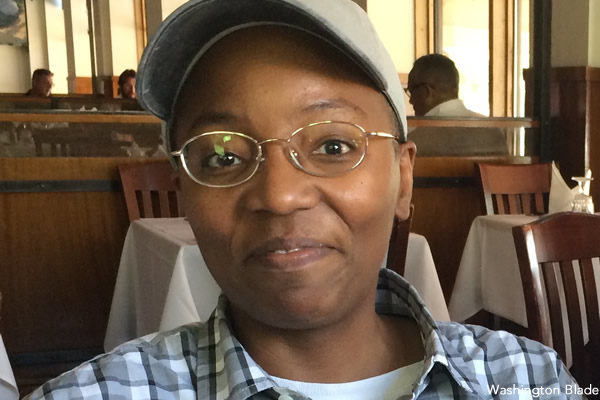
It’s important for the LGBTQ community and our issues to be treated respectfully and normalized in the same manner that mainstream media does for the cisgender-heterosexual community. The Blade takes our lives and opinions on all topics seriously and not just as “quirky” news. For example, the Blade would interview a drag performer about their political views and that becomes the news whereas the news for the straight press is simply that someone performs in drag. Their level of education or insights aren’t of interest.
I’ve read a few other LGBTQ publications in the region and very few strive to elevate LGBTQ discourse beyond the sensational.
Theater
‘Bad Books’ a timely look at censorship in local library
Influencer vs. conservative parent in Round House production

‘Bad Books’
Through May 4
Round House Theatre
4545 East-West Highway
Bethesda, Md.
Tickets start at $43
Roundhousetheatre.org
While a library might seem an unlikely place for a heated contretemps, it’s exactly the spot where adults go when they’re itching to battle out what books minors might be allowed to read.
In Sharyn Rothstein’s “Bad Books,” two women, The Mother (out actor Holly Twyford) and The Librarian (Kate Eastwood Norris), swiftly become mired in a quarrel that comes with some weighty repercussions.
The Mother is a popular conservative influencer on a mission. She’s furious that the local library has overstepped its bounds and she blames The Librarian, a woman who adheres to the “it takes a village” method of child rearing and is dedicated to the young people who approach her reference desk.
There’s some background. It seems The Librarian who dresses young (tight jackets and Doc Martens) and curses a blue streak, forged a friendship with Jeremy, a teenage library regular.
While the details are a bit hazy, it seems the troubled Jeremy confided in The Librarian regarding some personal issues. In return, she suggested a helpful book – Boob Juice.
Unsurprisingly, based solely on its title, the book has thrown The Mother into a pique of outrage. After finding Boob Juice in her son’s bedroom, she made a beeline to the library; and not incidentally, The Mother hasn’t read the recommended work and has no plans to do so.
Set in a suburb with lax gun laws, the story explores facets of division and conciliation. The Mother insists she isn’t so much about banning books as she is keeping some books away from young people until they’ve obtained parental approval.
“Bad Books” is performed in the round. Built on a rotating stage, Meghan Raham’s set is simple, pleasingly serviceable, and easily transforms from the library into a small corporate office, and later the assembly room of a church. Overhead floats a circular glass shelf filled with a cache of banned books. Things like a rolling book cart and a goldfish bowl add some flavor to the different locations.
The Mother wasn’t always a popular conservative warrior with an enthusiastic horde of followers.
Her past includes penning a book that later filled her with guilt and regret. She refers to that early questionable literary accomplishment as her bad book. And while over the years, she has persevered to find and destroy each and every printed copy, she hasn’t entirely succeeded.
Norris plays three women who figure meaningfully into the arc of Twyford’s mother character. In addition to The Librarian, Norris is The Manager, a broadly played piece of comic relief, and The Editor, a warm woman who reveals things about Jeremy that his own mother never knew.
Smartly staged by Ryan Rilette, the production is part of a National New Play Network Rolling World Premiere. While Rothstein’s script offers two strong roles (skillfully performed by celebrated actors Twyford and Norris), its ending feels too neatly resolved.
In the past, Twyford and Norris have successfully joined forces for numerous DMV productions including Studio Theatre’s production of David Auburn’s two-hander “Summer, 1976,” the story of a longtime and unlikely friendship between two women who meet as young mothers during the Bicentennial summer.
Though different, both The Librarian and The Mother share a strong and ultimately hopeful relationship with words.
There’s a quote from E.B. White’s classic “Charlotte’s Web” that pops up a couple of times in the briskly paced 80-minute play. Charlotte, the wise spider, says, “with just the right words you can change the world.”
Books
‘Pronoun Trouble’ reminds us that punctuation matters
‘They’ has been a shape-shifter for more than 700 years

‘Pronoun Trouble’
By John McWhorter
c.2025, Avery
$28/240 pages
Punctuation matters.
It’s tempting to skip a period at the end of a sentence Tempting to overuse exclamation points!!! very tempting to MeSs with capital letters. Dont use apostrophes. Ask a question and ignore the proper punctuation commas or question marks because seriously who cares. So guess what? Someone does, punctuation really matters, and as you’ll see in “Pronoun Trouble” by John McWhorter, so do other parts of our language.

Conversation is an odd thing. It’s spontaneous, it ebbs and flows, and it’s often inferred. Take, for instance, if you talk about him. Chances are, everyone in the conversation knows who him is. Or he. That guy there.
That’s the handy part about pronouns. Says McWhorter, pronouns “function as shorthand” for whomever we’re discussing or referring to. They’re “part of our hardwiring,” they’re found in all languages, and they’ve been around for centuries.
And, yes, pronouns are fluid.
For example, there’s the first-person pronoun, I as in me and there we go again. The singular I solely affects what comes afterward. You say “he-she IS,” and “they-you ARE” but I am. From “Black English,” I has also morphed into the perfectly acceptable Ima, shorthand for “I am going to.” Mind blown.
If you love Shakespeare, you may’ve noticed that he uses both thou and you in his plays. The former was once left to commoners and lower classes, while the latter was for people of high status or less formal situations. From you, we get y’all, yeet, ya, you-uns, and yinz. We also get “you guys,” which may have nothing to do with guys.
We and us are warmer in tone because of the inclusion implied. She is often casually used to imply cars, boats, and – warmly or not – gay men, in certain settings. It “lacks personhood,” and to use it in reference to a human is “barbarity.”
And yes, though it can sometimes be confusing to modern speakers, the singular word “they” has been a “shape-shifter” for more than 700 years.
Your high school English teacher would be proud of you, if you pick up “Pronoun Trouble.” Sadly, though, you might need her again to make sense of big parts of this book: What you’ll find here is a delightful romp through language, but it’s also very erudite.
Author John McWhorter invites readers along to conjugate verbs, and doing so will take you back to ancient literature, on a fascinating journey that’s perfect for word nerds and anyone who loves language. You’ll likely find a bit of controversy here or there on various entries, but you’ll also find humor and pop culture, an explanation for why zie never took off, and assurance that the whole flap over strictly-gendered pronouns is nothing but overblown protestation. Readers who have opinions will like that.
Still, if you just want the pronoun you want, a little between-the-lines looking is necessary here, so beware. “Pronoun Trouble” is perfect for linguists, writers, and those who love to play with words but for most readers, it’s a different kind of book, period.
The Blade may receive commissions from qualifying purchases made via this post.

Friday, April 18
“Center Aging Friday Tea Time” will be at 2 p.m. on Zoom. This is a social hour for older LGBTQ+ adults. Guests are encouraged to bring a beverage of choice. For more details, email [email protected].
Go Gay DC will host “LGBTQ+ Community Social in the City” at 7 p.m. at Hotel Zena. This event is ideal for making new friends, professional networking, idea-sharing, and community building. This event is free and more details are available on Eventbrite.
Trans and Genderqueer Game Night will be at 6 p.m. at the DC Center for the LGBT Community. This will be a relaxing, laid-back evening of games and fun. All are welcome and there’ll be card and board games on hand. Feel free to bring your own games to share. For more details, visit the DC Center’s website.
Saturday, April 19
Go Gay DC will host “LGBTQ+ Community Brunch” at 11 a.m. at Freddie’s Beach Bar & Restaurant. This fun weekly event brings the DMV area LGBTQ+ community, including Allies, together for delicious food and conversation. Attendance is free and more details are available on Eventbrite.
LGBTQ People of Color Support Group will be at 7 p.m. on Zoom. This peer support group is an outlet for LGBTQ People of Color to come together and talk about anything affecting them in a space that strives to be safe and judgement free. There are all sorts of activities like watching movies, poetry events, storytelling, and just hanging out with others. For more information and events for LGBTQ People of Color, visit thedccenter.org/poc or facebook.com/centerpoc.
“Spark Sapphic Social” will be at 8 p.m. at Spark Social House. This weekly sapphic social is an opportunity to mix and mingle with other sapphics in D.C.’s newest LGBTQ bar. This event is free and more details are available on Eventbrite.
“DC Drag Brunch on Rooftop – Penthouse (Formerly at Lima Twist)” will be at 12 p.m. at Baby Shank Rooftop. Hosted by Miss Capital Pride, this is the ultimate drag brunch experience in Washington, D.C., featuring the fiercest queens around. Prepare to be entertained by glamorous drag queens and celebrated celebrity impersonators, including Taylor Swift, Lady Gaga, Beyoncé, Britney Spears, Nicki Minaj, Ariana Grande, Whitney Houston, Cher and many more. Tickets cost $27 and are available on Eventbrite.
Sunday, April 20
Queer Crayon Club will host “Queer Sketch Social” at 3 p.m. at Sinners and Saints. This is a fun event for LGBTQ+ adults to come together and color. Attendance is free and more details are available on Eventbrite.
Monday, April 21
“Center Aging Monday Coffee & Conversation” will be at 10 a.m. on Zoom. This is a social hour for older LGBTQ+ adults. Guests are encouraged to bring a beverage of choice. For more details, email [email protected].
Tuesday, April 22
Genderqueer DC will be at 7 p.m. on Zoom. This support group is for people who identify outside of the gender binary. Whether you’re bigender, agender, genderfluid, or just know that you’re not 100% cis – this is your group. For more details, visit www.genderqueerdc.org or Facebook.
Coming Out Discussion Group will be at 7 p.m. on Zoom. This is a peer-facilitated discussion group and a safe space to share experiences about coming out and discuss topics as it relates to doing so. For more details, visit the group’s Facebook.
Wednesday, April 23
Job Club will be at 6 p.m. on Zoom. This is a weekly job support program to help job entrants and seekers, including the long-term unemployed, improve self-confidence, motivation, resilience and productivity for effective job searches and networking — allowing participants to move away from being merely “applicants” toward being “candidates.” For more information, email [email protected] or visit thedccenter.org/careers.
Asexual and Aromantic Discussion Group will be at 7 p.m. on Zoom. This is a space where people who are questioning this aspect of their identity or those who identify as asexual and/or aromantic can come together, share stories and experiences, and discuss various topics. For more details, email [email protected].
Thursday, April 24
Virtual Yoga with Sarah M. will be at 7 p.m. on Zoom. This is a free weekly class focusing on yoga, breath work, and meditation. For more details, visit the DC Center for the LGBT Community’s website.
DC Anti-Violence Project Open Meeting will be at 7 p.m. on Zoom. This meeting is open to anyone interested in learning more and getting involved in lessening violence both within and directed towards the LGBT communities. For more information, visit Facebook or Twitter.
-

 State Department5 days ago
State Department5 days agoHIV/AIDS activists protest at State Department, demand full PEPFAR funding restoration
-

 Brazil5 days ago
Brazil5 days agoUS lists transgender Brazilian congresswoman’s gender as ‘male’ on visa
-

 District of Columbia5 days ago
District of Columbia5 days agoCapital Pride wins $900,000 D.C. grant to support WorldPride
-

 Obituary4 days ago
Obituary4 days agoLocal attorney, LGBTQ rights advocate Dale Sanders dies at 75



